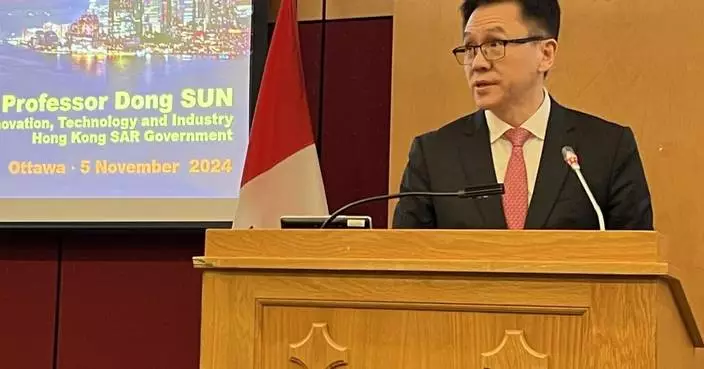DH to launch catch-up programme for human papillomavirus vaccination (first phase) on December 2
The Department of Health (DH) today (November 6) announced that a one-off catch-up programme (first phase) for human papillomavirus (HPV) vaccination will be launched on December 2 which aims to gradually boost the herd immunity of the community against high-risk HPV infection, thereby preventing cervical cancer.
In response to the World Health Organization (WHO)'s recommendation, the Centre for Health Protection (CHP) of the DH launched an HPV vaccination programme to Primary Five and Primary Six school girls under the Hong Kong Childhood Immunisation Programme (HKCIP) during the 2019/20 school year. The first dose of HPV vaccine will be given via outreach by the DH's School Immunisation Teams (SIT) to eligible Primary Five female students at their schools, and a second dose will be given to the girls when they reach Primary Six in the following school year. If students miss the vaccination in schools, they could attend a SIT sub-office or a Student Health Service Centre for a mop-up vaccination.
The vaccination rate for Primary Five and Primary Six school girls has remained high over the past five years. In the school years 2022/23 and 2023/24, the two-dose coverage rates of HPV vaccination for Primary Six school girls reached 91 per cent, which is much higher than the interim target (70 per cent) coverage for completion of two doses of HPV vaccination as stated in the Hong Kong Cancer Strategy 2019.
In 2022, the WHO further suggested to provide catch-up vaccinations to girls aged between 9 and 18. The Scientific Committee on Vaccine Preventable Diseases under the CHP also agreed earlier to expand the target group of HPV vaccinations to older girls aged 18 or below. Hence, the Government will launch a one-off catch-up vaccination programme by phases starting from December 2, 2024, for female Hong Kong residents who were born in 2004 or after, and have not been covered by the HKCIP (i.e. girls aged 18 or below as in 2022, and not being covered by existing programme) to receive a free HPV vaccination. Each of the eligible persons can receive two doses of vaccination, while immunocompromised persons have to receive three doses of vaccination (all three doses are free of charge).
The programme will last for about two years and will be implemented in three phases. The first phase will start from December 2, 2024. Targeted recipients will be full-time female students (including secondary sections of special schools) studying Secondary Five or above (or an equivalent grade) in Hong Kong. Schools can engage participating outreach vaccination teams to provide free HPV vaccines to eligible female students. The CHP will provide vaccines for the outreach vaccinations along with a subsidy of $105 per dose to doctors.
The second phase, which targets female Hong Kong residents studying in local post-secondary institutions or universities who were born between 2004 and 2008, is anticipated to be launched in the first quarter next year. For the third phase, which is expected to start in the first half of next year, female Hong Kong residents born between 2004 and 2008 who have completed their studies in Hong Kong will be the targeted group. Details of the second and third phases will be announced in due course.
All eligible persons participating in this programme must have been registered with eHealth. After joining eHealth, participants and their family members or caregivers may access at any time the vaccination records under this programme and various government vaccination schemes through the eHealth mobile app. Currently, under the HKCIP of the DH, all the vaccination records at the Maternal and Child Care Centres since 2007 and outreach vaccination activities at all primary schools since 2013 are recorded in the eHealth system. Members of the public who have registered with eHealth can access individual's vaccination records.
"Cervical cancer is one of the 10 most common cancers and a leading cause of cancer deaths for local females. Almost all cervical cancers are caused by persistent infection with high-risk HPV. HPV vaccines are very effective against high-risk HPV, which commonly causes cervical cancer. The WHO recommends all countries introduce HPV vaccines for girls aged 9 to 14 before their sexual debut, and provide catch-up vaccination for those aged 9 to 18 (including those who missed the vaccination and elder girls) in order to lower their risk of developing cervical cancer," a spokesman for the CHP said.
The Government will continue to provide quality medical and health services for students. In the 2024 Policy Address, the Government has promulgated initiatives to create a better growing environment for students. These include devising health promotion strategies by adopting a life‑course framework to formulate health management plans for the public according to age and health conditions; strengthening the Whole School Health Programme to recommend targeted school‑based measures for physical activities, meals and other matters to improve students' physical and psychological well‑being.
For more information about HPV vaccination catch-up programme, please visit the thematic website www.chp.gov.hk/en/features/108084.html.






